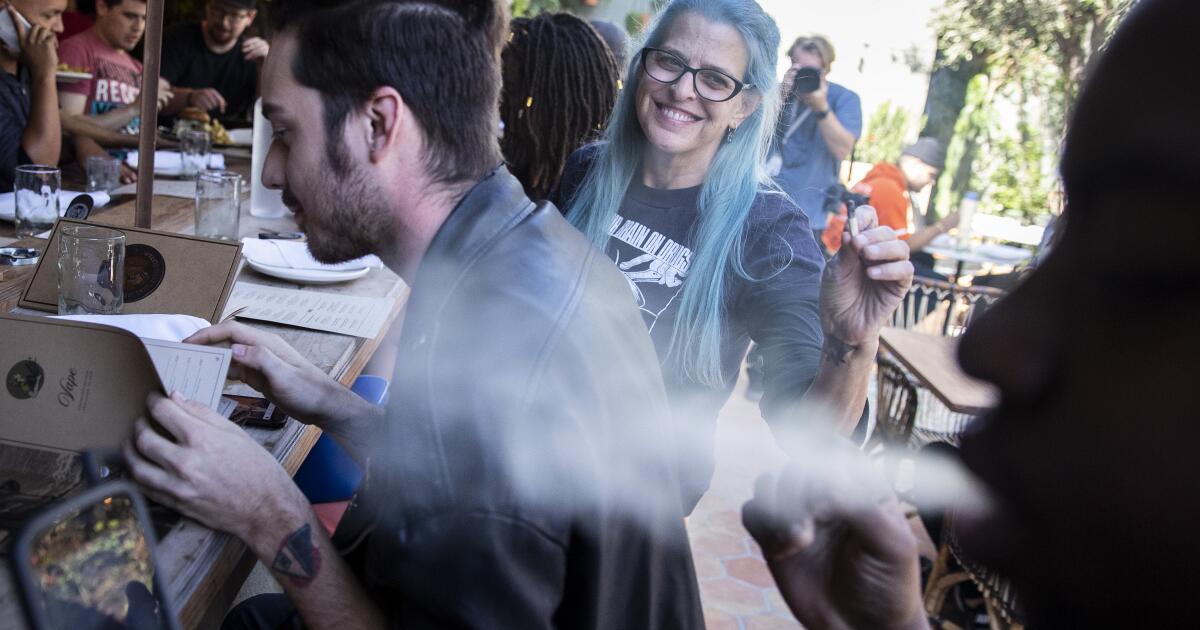
Despite concerns about the health risks of secondhand smoke, Gov. Gavin Newsom on Monday signed a bill that will allow cannabis dispensaries to serve hot food and nonalcoholic drinks.
Assembly Bill 1775, which goes into effect Jan. 1, gives California cities the option of allowing dispensaries to prepare and serve hot food and nonalcoholic drinks on site, as well as host live performances such as concerts and comedy shows.
Customers can already smoke, vape and sample edibles in some Golden State dispensaries, but the businesses are only allowed to sell prepackaged snacks and drinks.
Supporters say that a more comfortable recreational weed culture will help reinvigorate California nightlife and boost profits for the state’s highly taxed, highly regulated legal cannabis dispensaries, which compete with black-market sellers.
“Cannabis cafes are going to be a huge part of the future of cannabis in our state and help to beat back the illegal drug market,” said Assemblymember Matt Haney (D-San Francisco), who authored the bill.
The “cannabis cafe” model has been compared to Amsterdam, where the consumption of cannabis has been legal at coffee shops since the 1970s.
The bill had the support of the United Food and Commercial Workers union, which has unionized workers at dozens of dispensaries and grow facilities in California.
Newsom vetoed a similar bill last year over concerns that food workers and patrons could face health risks after being exposed to secondhand smoke.
The American Cancer Society and other public health groups pushed Newsom to veto this year’s bill, arguing that secondhand marijuana smoke has higher particulate levels than tobacco smoke and can cause health issues including cardiovascular disease, lung irritation and asthma attacks.
Jim Knox, the California managing director for the American Cancer Society Cancer Action Network, said in a statement that the new law will undermine the state’s decades-long fight to create smoke-free workplaces and could hamper the cultural shift away from smoking indoors.
Knox said that lawmakers and Newsom “prioritized the marijuana industry’s interests over public health.”
He said the group will continue to urge local cities to “resist efforts that would undermine our history of smoke-free restaurants and roll back critical public health protections.”
The bill signed into law Monday says that, if cities choose to impose ventilation standards as a condition for a permit, the systems must be powerful enough to prevent “smoke and odors from migrating to any other part of the building hosting the consumption lounge or any neighboring building or grounds.”
The bill also clarifies that cannabis cafe workers have the right to wear respirator masks, paid for by their employers. Employers would also be required to include secondhand smoke in their injury and illness prevention plans required under California labor law.
In his signing message, Newsom wrote that future bills that diverge from the bill’s “tailored approach” to worker protections against secondhand smoke “will not be looked upon favorably.”
Newsom wrote that it will be “critical” for local governments to prioritize worker safety and work to minimize public safety risks. If they don’t, he said, “it could necessitate reconsideration of this limited expansion.”

